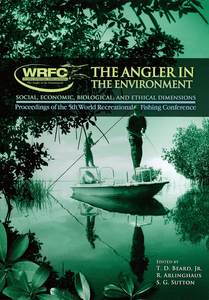Perceived benefits and costs of Recreational Only Fishing Areas to the recreational and commercial estuarine fishery within north Queensland
Tobin, Renae C., and Sutton, Stephen G. (2011) Perceived benefits and costs of Recreational Only Fishing Areas to the recreational and commercial estuarine fishery within north Queensland. In: Beard, T. D., Arlinghaus, R., and Sutton, S.G., (eds.) The Angler and the Environment: social, economic, biological and ethical dimensions. Proceedings of the fifth world recreational fishing conference. American Fisheries Society Symposium, 75 . American Fisheries Society, Bethesda, MD, USA, pp. 125-138.
![[img]](https://researchonline.jcu.edu.au/11772/7.hassmallThumbnailVersion/11772_Tobin_%26_Sutton_2011_Cover.jpg)
|
Image (JPEG) (Book Cover)
- Cover Image
Download (513kB) |
|
|
PDF (Published Version)
- Published Version
Restricted to Repository staff only |
Abstract
Recreational Only Fishing Areas (ROFAs) (i.e., areas where commercial fishing is excluded, leaving sole fishing access to recreational fishers) are often implemented to reduce conflict between recreational and commercial fishing sectors, and to enhance recreational fishing quality. This study explored recreational and commercial fishers' perceptions of estuarine ROFAs in north Queensland, Australia with the aim of understanding whether desired socio-economic benefits are realized. Recreational and commercial fishers in the study area believed that competition between the sectors was a problem; however, only recreational fishers suggested increased segregation of the sectors via ROFAs as a solution. Recreational fishers were largely unaware of the location of current ROFAs in the study area and therefore did not preferentially use these areas compared to areas open to commercial fishing. Likewise recreational fishers did not deliberately avoid areas frequented by commercial fishers, and the presence or absence of commercial fishing was not a major factor influencing recreational fishing site choice. Further, while recreational fishers expected to catch more fish in areas where commercial fishing does not occur, they had not noticed an improvement in catches in more recently formed ROFAs. Collectively, these results suggest that the existing ROFAs in the study area are not currently providing the expected benefits for fishers, and that adding more ROFAs would be unlikely to reduce conflict between commercial and recreational fishers. The effectiveness of the ROFAs may be improved if recreational fishers are better informed about their location. Further investigation is required to understand why recreational fishers do not choose to use current ROFAS, the cause of conflict between the recreational and commercial sectors, and whether expected catch benefits of ROFAs are being realized.
| Item ID: | 11772 |
|---|---|
| Item Type: | Book Chapter (Research - B1) |
| ISBN: | 978-1-934874-24-0 |
| Keywords: | recreational fishing, recreational only fishing areas, marine parks, conflict, perception |
| Funders: | CRC Reef Research Centre, James Cook University |
| Projects and Grants: | Renae Tobin PhD |
| Date Deposited: | 18 Jan 2012 04:37 |
| FoR Codes: | 05 ENVIRONMENTAL SCIENCES > 0502 Environmental Science and Management > 050209 Natural Resource Management @ 20% 07 AGRICULTURAL AND VETERINARY SCIENCES > 0704 Fisheries Sciences > 070403 Fisheries Management @ 80% |
| SEO Codes: | 83 ANIMAL PRODUCTION AND ANIMAL PRIMARY PRODUCTS > 8302 Fisheries - Wild Caught > 830201 Fisheries Recreational @ 60% 83 ANIMAL PRODUCTION AND ANIMAL PRIMARY PRODUCTS > 8302 Fisheries - Wild Caught > 830204 Wild Caught Fin Fish (excl. Tuna) @ 40% |
| Downloads: |
Total: 199 Last 12 Months: 4 |
| More Statistics |



